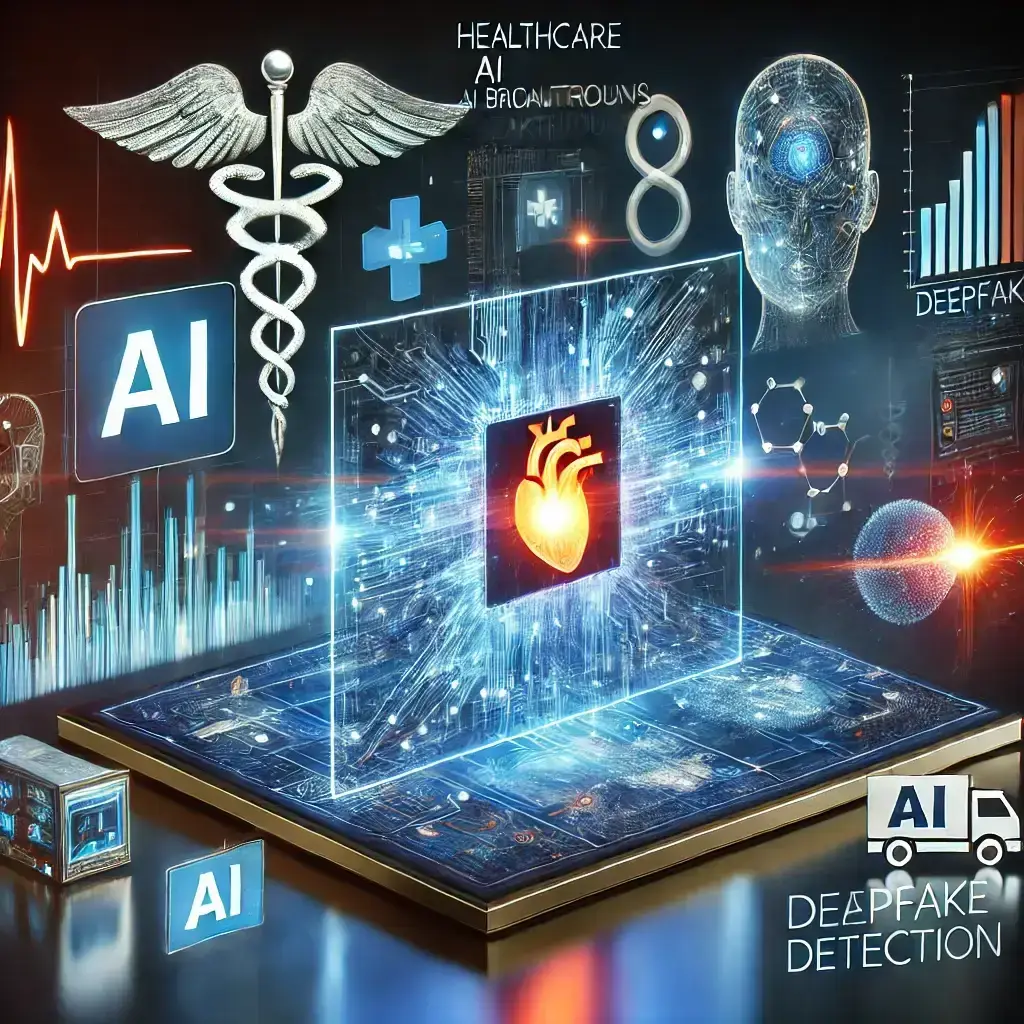As we approach 2024, the world of AI is rapidly evolving. In this AI News 2024 report, we explore the latest innovations in supercomputers, healthcare AI advancements, and deepfake detection technologies
The Role of AI Supercomputers in 2024
Elon Musk’s Colossus: The Most Powerful AI Supercomputer
Elon Musk is once again pushing technological boundaries. In just 122 days, Musk’s team built Colossus—a AI supercomputer in 2024 that now claims the title of the most powerful AI machine in the world. It’s powered by 100,000 Nvidia GPUs, the same chips behind many of today’s cutting-edge AI models. But Musk isn’t stopping there. Plans are already underway to double Colossus’ capacity to 200,000 chips, which would catapult it even further ahead in the supercomputing race.
What makes Colossus different? Aside from sheer power, Colossus is built with a singular focus on artificial intelligence, making it a game-changing tool for AI research and applications. From advanced machine learning to natural language processing, Colossus is expected to handle some of the most complex AI workloads that could accelerate breakthroughs in various fields—from medicine to robotics.
With such massive computing power, Colossus could help companies and researchers tackle previously unsolvable problems, pushing AI applications to new heights. Musk’s vision for the supercomputer is clear: to leverage AI to solve the world’s biggest challenges, whether that’s climate modeling, space exploration, or autonomous technologies.
However, Colossus also signals an escalating arms race in AI infrastructure. Tech giants like Google and Microsoft have been working on their own powerful AI models and supercomputing systems, but Colossus may leave them scrambling to keep up. The stakes are higher than ever as companies compete not just in software but in the computing power required to develop and train next-generation AI models.
The future possibilities with Colossus are immense. It will be interesting to see how its vast capabilities are put to use, and whether it becomes a stepping stone towards creating even more powerful AI systems. With Musk’s track record of turning ambitious projects into reality, Colossus is undoubtedly a development worth watching.
Impact: Colossus could accelerate the race for AI supremacy and foster greater competition in AI research, pushing the boundaries of what’s possible in fields like medicine, space, and energy.
Source: Read more about Elon Musk’s Colossus on Futurism.
AI in Healthcare: Innovations and Impact in 2024
Google DeepMind’s AlphaProteo: Revolutionizing Disease Treatment
Google DeepMind’s AlphaProteo system is set to change the future of medicine showing the deep role of AI in healthcare in 2024. By leveraging advanced artificial intelligence, AlphaProteo can design custom proteins capable of targeting specific molecular structures. This “biological lock-and-key” mechanism allows proteins to bind with incredible precision, which is crucial for treating complex diseases like cancer and viral infections.
AlphaProteo’s potential in drug discovery is groundbreaking. In recent tests, it outperformed current methods by a staggering 3 to 300 times, creating proteins that bind more effectively to disease-causing molecules. This capability could drastically accelerate the development of new treatments, reducing the time required to bring life-saving drugs to market.
One of the most remarkable achievements of AlphaProteo is its success in designing proteins to target SARS-CoV-2, the virus behind COVID-19. In lab tests, AlphaProteo-designed proteins were able to block the virus from infecting cells. This opens the door to more targeted and efficient therapies for viral infections, which could be a game-changer for global public health.
In the realm of cancer treatment, AlphaProteo has designed proteins that specifically target cancer-related proteins, showing promise in therapies that could reduce side effects and improve patient outcomes. Traditional methods of drug discovery can take years, but AI-driven approaches like AlphaProteo are capable of reducing that timeline to just days or weeks.
The impact of AlphaProteo: This system could reshape the pharmaceutical industry, making personalized medicine more accessible and efficient. By speeding up drug discovery and providing more targeted treatment options, AlphaProteo is set to have a profound impact on how we treat complex diseases.
Source: Read more about AlphaProteo and its breakthroughs.
Deepfake Detection Technology: How AI is Evolving in 2024
YouTube’s Deepfake Detection: A Game-Changer for Content Creators
In a world where deepfake technology is becoming more sophisticated and widespread, YouTube is taking a stand to protect its creators. Deepfakes, which use AI to manipulate videos and audio, have raised significant concerns about privacy, consent, and misinformation. In response, YouTube is developing Deepfake detection AI tools to prevent creators’ likenesses—whether their faces or voices—from being copied without their knowledge or consent.
This new technology is designed to identify synthetic media, expanding on YouTube’s existing Content ID system. Currently, Content ID helps protect copyrighted material, but the new system will go further by identifying when deepfakes or AI-generated content is being used without permission. This move is crucial as AI-generated media is becoming more difficult to detect with the naked eye.
The impact of these tools could be far-reaching. By protecting creators from unauthorized use of their likenesses, YouTube is fostering a safer environment for both creators and viewers. These tools will also help curb misinformation, which has become a growing problem as deepfake videos are sometimes used to spread false information or create misleading content.
Additionally, YouTube’s deepfake detection system could set a precedent for other social media platforms to follow, pushing for more comprehensive AI safety measures across the internet. As deepfake technology continues to evolve, having advanced detection tools in place will be critical for maintaining trust and transparency in digital content creation.
Impact: YouTube’s deepfake detection tools are a significant step towards safeguarding digital identity, preventing misuse, and ensuring a more secure online ecosystem for content creators and users alike.
Source: Learn more about YouTube’s deepfake detection tools.
Yi-Coder: A Powerful Yet Compact AI for Developers
Yi-Coder is making waves in the AI coding space by offering powerful programming capabilities in a compact open-source model. Unlike massive models from tech giants like OpenAI and Google, Yi-Coder is designed to be lightweight while still delivering impressive performance across 52 programming languages.
What sets Yi-Coder apart is its versatility in tasks such as code editing, completion, debugging, and even mathematical reasoning. Despite its smaller size, Yi-Coder manages to perform on par with much larger models, offering a streamlined solution for developers looking to enhance productivity without the need for heavy computational resources.
Yi-Coder’s size is a significant advantage for individual developers and small teams, who might not have access to the large-scale infrastructure required to run bigger AI models. By democratizing access to advanced coding assistance, this tool could level the playing field for developers at all skill levels, allowing them to write, debug, and optimize code with greater efficiency.
Moreover, Yi-Coder’s ability to handle a wide array of programming languages makes it a valuable resource for developers working in multi-language environments. Whether you’re building a website, optimizing algorithms, or working on data analysis, Yi-Coder offers solutions that are both powerful and accessible.
Impact: With its compact design and broad capabilities, Yi-Coder could revolutionize the way developers work, offering a more accessible yet highly effective tool for coding, thus potentially challenging larger AI coding models.
Source: Learn more about Yi-Coder.
Learn more about AI code generation for startup’s here
Apple’s ‘It’s Glowtime’ Event: AI Takes the Spotlight
Apple is making bold moves in the AI space with the unveiling of Apple Intelligence at its recent “It’s Glowtime” event. The event, which primarily showcased the iPhone 16, also highlighted AI-powered features that promise to revolutionize the Apple ecosystem. Leading the charge is Apple Intelligence, an AI feature designed to provide real-time, context-aware suggestions, marking a significant leap in Apple’s AI capabilities.
Apple Intelligence aims to take user interaction to the next level by offering intuitive, predictive suggestions that seamlessly integrate into daily tasks. Whether it’s managing schedules, sending messages, or providing personalized recommendations, Apple Intelligence is set to outperform Siri, making it seem almost obsolete by comparison. This move signals a strategic shift for Apple, as it places greater emphasis on AI-driven user experiences.
The event also teased AI-driven enhancements across other product lines, including the Apple Watch and AirPods, focusing on health-tracking and seamless device integration powered by AI. These AI innovations are not limited to the hardware either; Apple is pushing for AI to become a core part of its software ecosystem, enhancing productivity and user convenience.
What makes this announcement even more intriguing is the comparison to Google’s recent AI advancements. While Google has been leading in AI-powered tools like AI cameras and device integration, Apple’s new features show that the tech giant is ready to compete at the highest level.
Impact: With the introduction of Apple Intelligence, Apple is stepping up its game in the AI-driven tech race, enhancing user experiences and setting the stage for future AI integrations that could further elevate its ecosystem.
Source: Learn more about Apple’s AI advancements.
Replit’s AI Agent: Simplifying App Creation for Everyone
Replit is making waves in the tech world with its new AI-powered tool, Replit Agent, designed to allow users to build full software applications using just simple text prompts. This breakthrough means that even individuals without any coding experience can create and deploy apps with minimal effort.
The Replit Agent leverages advanced AI to understand natural language instructions and translates those into functioning code. Users can describe the app they want, and the agent generates a customizable development plan, choosing the right technologies and frameworks automatically. Whether you’re building a web-based app or something more complex, the Replit Agent handles it all, from coding to deployment.
This tool offers a powerful solution to one of the biggest hurdles for beginners and non-developers—setting up and managing coding environments. By automating the development process, Replit is making coding more accessible to a broader audience and empowering people to turn their ideas into reality with just a few prompts.
The Replit Agent is available across both web and mobile platforms, making it easier for users to interact with the tool on-the-go. The potential applications for this AI tool are vast, from small business owners looking to create their own apps to hobbyists wanting to experiment with tech.
Impact: Replit’s AI Agent could drastically lower the barriers to entry for software development, enabling people without technical expertise to create functional apps, leading to broader innovation across industries.
Source: Learn more about Replit’s AI-powered tool.
DeepMind’s GenRM: AI That Validates Its Own Outputs
DeepMind is setting a new standard for AI reliability with its latest model, GenRM, an AI system designed to verify its own outputs. This groundbreaking approach eliminates the need for separate verification models or human oversight, which are traditionally required to ensure the accuracy of AI-generated results. With GenRM, generation and verification are combined into a single process, improving both efficiency and reliability.
One of the most impressive aspects of GenRM is its use of chain-of-thought prompting, a method that encourages the AI to think through its answers step by step. This technique allows the model to catch subtle mistakes that might otherwise go unnoticed, mimicking human critical thinking. This could have significant implications for industries where accuracy is paramount, such as healthcare, finance, and scientific research.
By integrating this self-check mechanism, GenRM drastically reduces the error margin in AI outputs, making it one of the most advanced models in AI development today. It has the potential to be a game-changer in fields where precision and accountability are key.
As AI becomes more ingrained in decision-making processes, having models like GenRM, which can self-validate their work, is critical for preventing the misuse or errors often associated with autonomous systems.
Impact: GenRM could become a cornerstone in trustworthy AI, enhancing the reliability of AI applications across various industries, particularly those that require high levels of accuracy and self-verification.
Source: Learn more about DeepMind’s GenRM.
Upwork: Transforming Into an ‘OpenAI Shop’
In a bold move, Upwork, the world’s largest freelance marketplace, has embraced OpenAI technologies across its internal operations, product offerings, and team productivity tools. By integrating OpenAI’s cutting-edge AI models, Upwork aims to enhance the platform’s efficiency while offering AI-powered solutions to its users. This transition marks Upwork’s transformation into an ‘OpenAI shop’, putting the power of artificial intelligence at the core of its services.
Internally, Upwork is leveraging AI to boost productivity, streamline its workflow, and optimize operations. These tools are designed to help teams make better decisions faster, improve communication, and reduce the time spent on repetitive tasks. For freelancers and businesses using the platform, OpenAI is now integrated into the marketplace’s product portfolio, enabling smarter matching, automated task recommendations, and more personalized job searches.
Upwork’s decision to fully integrate OpenAI into its ecosystem demonstrates the growing trend of businesses adopting AI-driven models to stay competitive in a rapidly changing market. With these new capabilities, the platform is positioned to provide freelancers and clients with faster and more accurate job matching, creating a more efficient marketplace experience.
Impact: Upwork’s shift to an OpenAI-powered platform is likely to raise the bar for other freelance marketplaces, enhancing both internal efficiencies and user experiences. This move places Upwork at the forefront of AI integration in the gig economy.
Source: Read more about Upwork’s transformation with OpenAI.
Learn more about Open AI’s ChatGPT here
As we see in 2024, AI is revolutionizing all industries includes development of AI Supercomputers, AI in healthcare and Deepfake Detection through AI, its a crazy time we are living in!
Read more below:
AI Tools 2024: Are These Innovations Building or Destroying Jobs?



